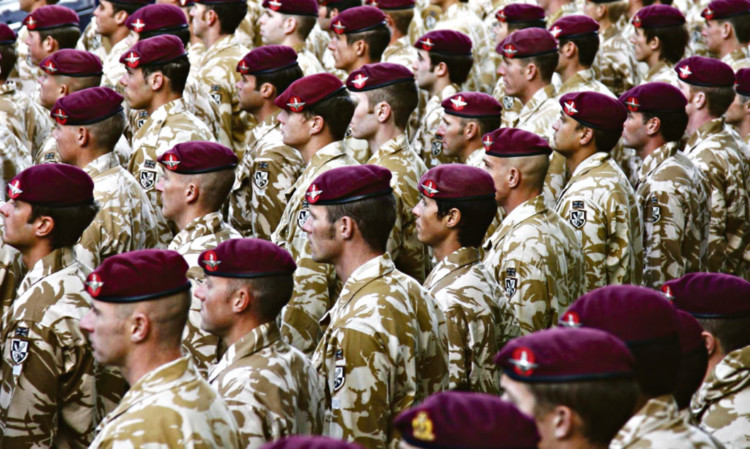
Scores of soldiers have been booted out of the British Army because they’re too fat to fight.
Figures released by the Ministry of Defence show at least 50 extreme cases where soldiers have been discharged because of obesity.
The Sunday Post understands hundreds more squaddies have been branded unfit sparking fears over the army’s war-fighting ability.
Tam Fry, a board member of the National Obesity Forum, described the latest findings “deeply worrying”.
The statistics, released under Freedom of Information laws, show the number of regular soldiers released because they are unfit to fight between the start of 2002 and March 31 last year.
Defence chiefs refused to reveal whether any troops had been discharged in the past 14 months, raising concerns the numbers could be even higher. An MoD spokesman said information of those released on medical grounds would be published next month.
However, according to the latest statistics, in 2011 alone 13 soldiers were discharged where obesity contributed to their ill-health. The figures were published just months after it was revealed Scotland’s super regiment is blighted by unfit soldiers.
Troops serving with the Royal Regiment of Scotland have failed fitness tests 630 times in the past three years. The Royal Highland Fusiliers were the worst hit, with soldiers failing tests involving timed runs, press-ups and sit-ups, 170 times.
The Black Watch were the next worst affected, with soldiers failing the two-minute tests 120 times.
The MoD says troops who fail are told to take more physical training. Only in extreme cases does failure result in discharge from the army.
Mr Fry said he feared British troops were facing the same problems as the US military. There, nearly half of all soldiers on active duty are overweight and 19% obese according to an official report published last year.
He said: “It should be as concerning to the taxpayer as to the military that British personnel are being discharged because of obesity. After news earlier this year that troops of the Royal Regiment of Scotland were branded too unfit to fight the latest discharge figures are deeply worrying.
“The forces have every opportunity to keep their men and women in shape that’s what boot camps are for but they appear no better than civilian governments in maintaining their population’s fitness. It should be no comfort to us either that, from figures released this month, the same problem confronts the US military. In Washington generals are dubbing the crisis a national emergency.”
An MoD spokeswoman said it is a condition of service all solders are healthy and fitter than the general public. She said: “Overall obesity levels within the army are consistently lower than in civilian life. All individuals are assessed on their ability to carry out military activities rather than on their weight.”
Former Army sergeant Cammy MacLeod questioned whether today’s soldiers would have been fit enough to fight on the Normandy beaches at D-Day.
Cammy, 47, of East Kilbride, Lanarkshire, said: “It is not just the soldiers who were a lot fitter then, it was the civilians. What has changed is lifestyle.
“I remember as a kid a Mars Bar was a Friday night treat. Nowadays the kids are looking for a chocolate bar or two a day it’s regarded as necessary.”
The fitness instructor, who runs Alba Military Fitness, said soldiers needed to take responsibility for their own fitness.
He said: “Soldiers being obese is entirely their own problem. Lives depend on a high level of fitness. If you have got an unfit soldier, you are carrying a liability.”

Enjoy the convenience of having The Sunday Post delivered as a digital ePaper straight to your smartphone, tablet or computer.
Subscribe for only £5.49 a month and enjoy all the benefits of the printed paper as a digital replica.
Subscribe